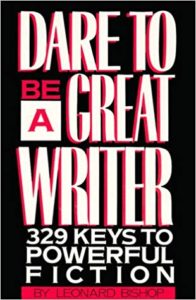Editor’s note: This is Kris. I am in the weeds today proofing galleys, so my sister and co-author Kelly is taking the wheel. Besides, I had nothing interesting to say today and as you will see, she certainly does. Enjoy.
By PJ Parrish
Have you ever been in a conversation with someone who is telling a long, convoluted anecdote and when they get to the end, the punchline hangs in the air like stale cigar smoke with the audience looking bewildered? And in that uneasy silence, the story-teller will invariably add: “Well, maybe you had to be there.”
As novelists, we want the reader to be there. We want to take him or her into that sweltering swamp, or high on a cliff over some rocky canyon. Most important, we want to reader to walk in the shoes of our protagonist. We want to make the reader feel as if he sometimes IS that character, seeing and feeling what our character does.
Easy, you say. I can write about a detective’s daily life because I am one. Or I have unlimited access to someone who will share with me the techniques and processes of crime investigation, and if I’m really lucky, that person will open up to me and share his inner feelings and insecurities.
If that’s true, you do not need to read the rest of this post.
But the vast majority of new crime writers – and even veteran ones — do not have that unlimited source of cop info in the form of someone sitting next to them in their living room watching the Packers beat the Lions. They can’t just turn and shout: “Hey, Aunt June, you worked in Miami PD. What kind of gun would my bad guy use in this situation?” Or “Hey Pop, you worked homicide. How come my detective just can’t shoot the bad guy in the leg?”
If you are a dogged researcher, you can find some of this info by scouring the web for police discussion boards. Or you can read books like Kathryn Ramsland’s The Forensic Psychology of Criminal Minds or Lee Lofland’s Police Procedure & Investigation. Another resource is binge watching reality TV shows like the First 48, which offers a unique, realistic look at the officers as their investigation unfolds. My co-author, Kris and I have done all these things. We’re also lucky to have some cop-friends, like Jim, a retired Michigan State Police captain who helped us with our upcoming release The Damage Done.
But last week, I discovered that no matter how much we think we know about someone else’s profession, there is nothing quite like “being there.”
I got to attend the Writer’s Police Academy in Green Bay, Wisconsin. It was founded ten years ago by Lee Lofland, a veteran police investigator who worked in Virginia’s prison system and later became a sheriff’s deputy, earning the highly-prized detective’s gold shield. He also writes a terrific cop-writer blog called The Graveyard Shift.
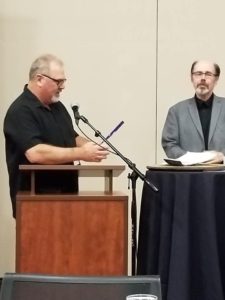
Lee Lofland with Guest of Honor Jeffery Deaver.
Imagine how it feels to hold a real nightstick and jab at the belly of a 250-pound man who is approaching you in a menacing manner. Imagine how it feels to realize that your jabs are futile and you have to resort to using that baton in a more aggressive manner, all the while conscious of the laws and department procedures that guide your every thrust or wallop.
Imagine how it feels to drive a police cruiser and attempt what is called a Pit Maneuver by tapping the bad guy’s car on the rear and forcing him to spin out and stop. Imagine how it feels, as one of the students learned, to misread the tap angle at forty miles an hour and completely destroy the bad guy’s test car, all in front of your fellow writers and a team of seriously dedicated law enforcement officers.
Those are just two of the real life experiences we were privileged to enjoy while at the police academy. Others included a stint in the “Shoot, Don’t Shoot” simulator, where we walked through a house or business, looking for an active shooter or armed and violent spouse. We had to decide when — and if — to fire. Yes, we were working in a simulated scenario but the adrenalin rush was real.
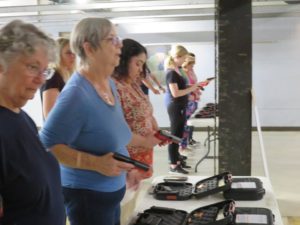
Writers at the range
The Glock I shot was heavier than I remembered from my early days of target shooting and its kick was far more intense. The vests are also heavier than I thought they’d be and I learned while they are called ‘bullet proof,” in reality they are not. One officer called them “bullet resistant.”
We learned a little about the history of the taser and how it works. And let me tell you, it is nothing like you see on TV. One of my class members, a brave young lady who really wanted a true experience, volunteered to be tased. I admire her dedication to authenticity but I was very glad I was not on the receiving end of those two little barbs. They say the current only lasts five seconds but I bet the person getting tased would say it feels much longer.
Evan Gilbert and myself getting tazed. Would not like to do that again.
Posted by Devin Reif on Friday, August 10, 2018
We learned about undercover work and outlaw motorcycle gangs. We made a forced entry as a SWAT team. We watched firefighters don backbreaking equipment and enter a smoke filled building. We watched as the Green Bay dive team tried to recover a body from a murky river. We all knew the body was fake but still, we all stood there on the banks of the river with bated breath, for the diver to announce he had located the child.
Being there is what is was all about. To use one of Michael Connelly’s favorite words, it gives verisimilitude to your writing. Because once you have experienced it, once you have felt that fear, smelled the smoke, or trudged under the weight of Kevlar, you cannot help but carry those emotions over to your writing.
But best, the absolute best, were the rare and unscripted moments with the officers after the training.
In today’s climate, there was no doubt these men and women teaching us at the academy had strong feelings on the hot issues. But it was never in the fore front, never presented as a stated point of view. And to me, it was brought up one once.
The moment came after traffic stop training, where we learned how to safely approach a vehicle and more important, why to approach it that way. The officer and I were in the hot sun, sweaty and tired toward the end of the day and I was thanking him for taking the time to do this for us writers, to patiently explain procedures and offer insights into their job.
This officer, who was around thirty maybe, said to me: “We do it because we want you to understand. We want you to see things from our side and we want you to know more about us.”
Then he looked me in the eye and as he wiped sweat from his brow, he added, “I work with a hundred officers in my own department and dozens more in others. I don’t know anyone who sets out in the morning looking to hurt anyone.”
If you’d like to know more about Lee Lofland’s Writers Police Academy, CLICK HERE to check out his site. I encourage any writer who wants to experience what is really like for their protagonist, to attend WPA or participate in a local Citizen’s Police Academy in their town . And yes, continue to read the books by officers on procedure and investigations. They are pretty good, too. Which brings to mind, one I read many years ago. True Blue by Randy Sutton. When a book makes you cry, you tend to remember it.
Like I said, it’s all about being there.


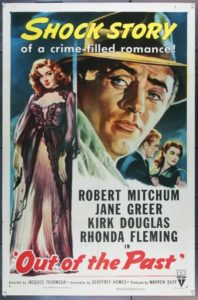
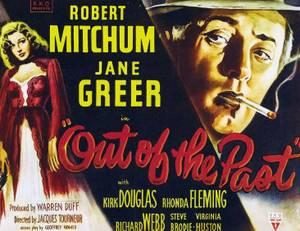

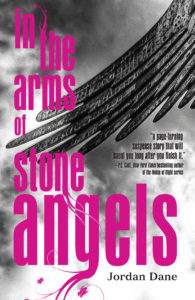

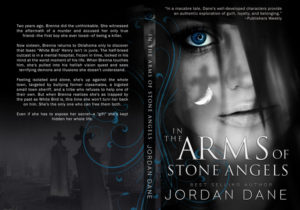
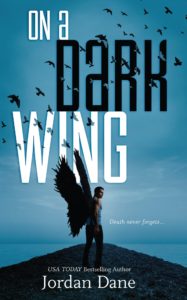

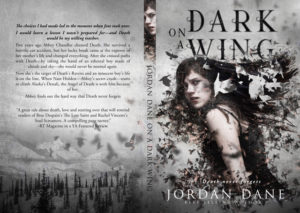


 The other day I jotted down a juicy detail from my research on the corner of yellow scrap paper. Hours later, after I’d used the tidbit in a scene, I spaced throwing away the note.
The other day I jotted down a juicy detail from my research on the corner of yellow scrap paper. Hours later, after I’d used the tidbit in a scene, I spaced throwing away the note.